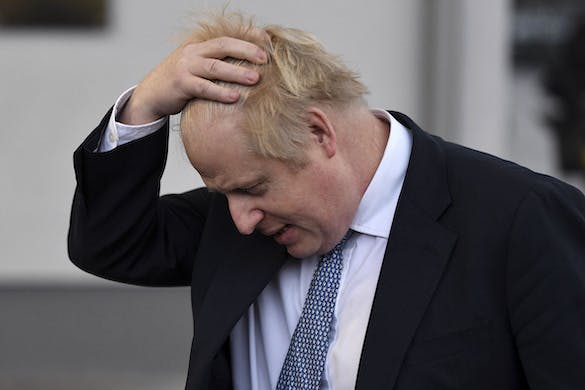Tories Are in a Tight Spot Over Fate of Boris Johnson
Is British liberty advanced, or is it jeopardized, by challenging the prime minister’s hold on power?

“No boasting like a fool,” Macbeth reprimands himself, “This deed I’ll do before this purpose cool.” Conservative members of parliament might consider whether such derring-do is to their advantage, as they contemplate forcing a vote of confidence in their leader and prime minister, Boris Johnson. Is British liberty advanced, or is it jeopardized, by challenging BoJo’s hold on power?
As one Labor peer, Lord Adonis, tweeted this morning, “If Boris goes, Brexit goes.”
Your Diarist is the last to deny that this is an easy question. There are so many reasons why Brexiteers have lost faith in Mr. Johnson. Even before the government’s overreach — and overreaction, some might argue — in respect of the shutdown of the commercial sector for Covid and the lockdown mandates, there were the vast spending announcements in early 2020 on infrastructure and climate.
“Partygate” and the government’s disregard of its own guidelines to self-isolate, stoked the current fires on the back benches. “Rules for thee, not for me,” is the refrain at Westminster. That the most egregious instances occurred at 10 Downing Street itself but adds to the irony.
The Conservative government finds itself on the ropes, trailing the Labor opposition by between three and ten points in late January polling. In reaction, Tory MPs have been submitting letters of no confidence since late last year to the chairman of the 1922 Committee, the backbench organization that oversees Party operations.
Fifteen percent of the parliamentary caucus can trigger a review; at present, that means 54 from a total of 360 MPs. Were a vote held, the Prime Minister would need a minimum of 181 supporters (50% + one) to remain in office.
Fifteen discontents have gone vocal so far. Yet only the chairman, Sir Graham Brady, knows how many letters he has received (or letters that have been rescinded). As the year began, pundits proclaimed that reaching the threshold was but days away, yet still we wait. None perhaps more anxiously than BoJo himself.
The Prime Minister wrote his colleagues a fortnight ago, soliciting support and vowing that their complaints were directing his course correction. Various administrative changes followed at No. 10, with an emphasis on placating Brexit hardliners. Among these gestures is Jacob Rees-Mogg’s appointment as minister for “Brexit Opportunities and Government Efficiency.”
Is this enough to stave off rebellion? The Gray Report on Partygate remains on hold until the Metropolitan Police can investigate 12 of 16 lockdown violations. If Boris Johnson is found to have contravened his own guidelines, commentators — save for The New York Sun — are generally agreed his premiership is over. When, after all, does a “fining” offense become a “firing” offense?
In the meantime, the Prime Minister has some time to placate his MPs. As the new year progressed, he initiated a “red meat” program to address flagrant illegal immigration at the English Channel and to scrap user fees for a shamelessly partisan BBC.
Before the Commons rose last week for a fortnight recess, Mr. Johnson announced that the government’s Covid restrictions would end “a full month early,” with mask mandates and self-isolation requirements elapsing before February’s close. Surely this fillip of good news would win him some good will?
Still, a second event — in addition to the denouement of Partygate — could haunt BoJo’s two-week absence from Parliament: That would be the Conservative Party’s showing in local elections in May. The timing of either could sink his premiership.
Yet Tory discontents have their own difficult time before them. If they are successful in defenestrating the Prime Minister, who will replace him? For Brexit stalwarts dedicated to maximizing liberty and minimizing government, there are no sterling prospects.
Potential candidates on the ministerial benches, like Chancellor of the Exchequer Richi Sunak, Foreign Secretary Liz Truss, and Mr. Rees-Mogg, all support Government policy on Covid, “Net Zero Carbon,” and Treasury largesse to quiet a disgruntled public. Such is the price of Cabinet solidarity.
Yet few on the Conservative backbenches have credible chops to step into Mr. Johnson’s shoes at Number 10, though Brexit stalwart MP Steve Baker has potential.
Furthermore, does a challenge of the leadership, successful or not, only bolster the chances of the leader of Labor, Sir Keir Starmer? Regardless of personal views on their Conservative colleagues heading the government, does the backbench really want to embolden the Opposition at this critical time in the fortunes of their party and their country? (Let’s not press the question of which of the two takes priority.)
The Daily Express quotes one EU expert who believes that with a Labor Government, “we would expect to see a partial Brexit reversal in the form of an attempt to forge a different relationship with the EU, possibly even an association agreement.”
Brexit purists, pondering the Prime Minister’s fate might, well still declare, “Fiat justitia ruat cælum” — Let justice be done, though the heavens might fall. Undermining an already weakened Conservative ministry, though, should give them pause.
________
BrexitDiarist@gmail.com

